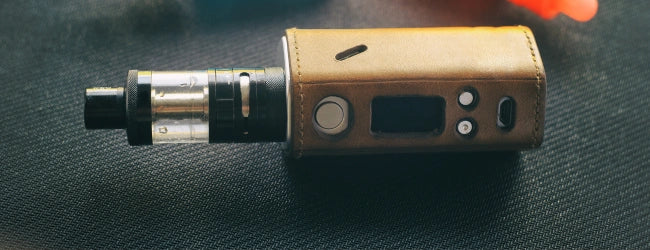
Which resistor should I choose for vaping CBD e-liquid?
|
|
Reading time 4 min
|
|
Reading time 4 min
A CBD vape session can be ruined... by the wrong choice of resistance! That's a real shame. It's best to find out beforehand, to get the most out of your CBD vape. I'll explain everything so you know how a resistor works and how to choose it to optimize your CBD e-liquid.
I'm going to quickly remind you how an electronic cigarette, or vape pen, disposable or refillable, works, because I think you already know why vaper CBD.
It's important to understand that the resistor is the heart of your vaping device. It's the heating element that vaporizes the e-liquid. Thanks to it, your vaporizer will be able to heat your CBD e-liquid, turning it into vapor. Its role is therefore central to CBD vaping.
In practical terms, the resistor looks like a mini steel cylinder, and consists of a resistive wire (mesh or kanthal) and a wick (often cotton) impregnated with e-liquid.
If you press the button on your vaporizer, the resistive wire heats up, soaking up more of the cotton and creating the vapor.
The resistor is located in the clearomizer. This is the part of your vape equipment that needs changing. Resistors don't last forever. Sooner or later, the e-liquid-soaked cotton will be completely full, and that's when you need to change the resistor.
You'll see that there are many different types of heating element, to meet different consumer needs. Hot steam, maximum steam, tight draft...
So to select the right resistor, you first need to understand how it works. I think you've understood that it's central in a vaporizer, because it's what triggers the creation of vapor.
The resistance value is expressed in ohms (Ω). This value has an influence on various points such as the heat to heat the e-liquid, the vapor that will be created, and the sensation that the person vaping will feel.
The resistor heats up faster and stronger if the resistance value is low. This is known as sub-ohm vape, and is adopted by big cloud enthusiasts. But clearly, I don't recommend it for vaping CBD.
For optimal vaping of CBD e-liquid, it' s best to use a high resistor value, which means it heats up more gently. It may produce less vapor, but you'll have better control, and your e-liquid won't be altered.
Cannabidiol remains a fragile molecule that can deteriorate rapidly under heat. To vaporize CBD e-liquid correctly, I therefore recommend a resistance of over 1 ohm.
Thanks to a resistance of over 1 ohm, you also gain other advantages. Your e-liquid is heated slowly, so the CBD is preserved. You get less hit, and better control of your consumption.
You preserve the natural or flavored taste of your CBD e-liquid, which may be altered if the resistance is too low (and therefore heats up more).
How do you choose your resistance? I'm here to guide you. Choosing the right resistor depends on its ohm value, but there are other criteria to consider too:
Finally, you need to think about the right PG/VG ratio, which is also related to resistance. CBD e-liquids often have a high propylene glycol ratio, and are therefore more fluid. A higher resistance will be better able to absorb them and limit the risk of leaks.
Above all, avoid sub-ohm resistors, such as 0.5 ohm, which heat up the CBD too much.
